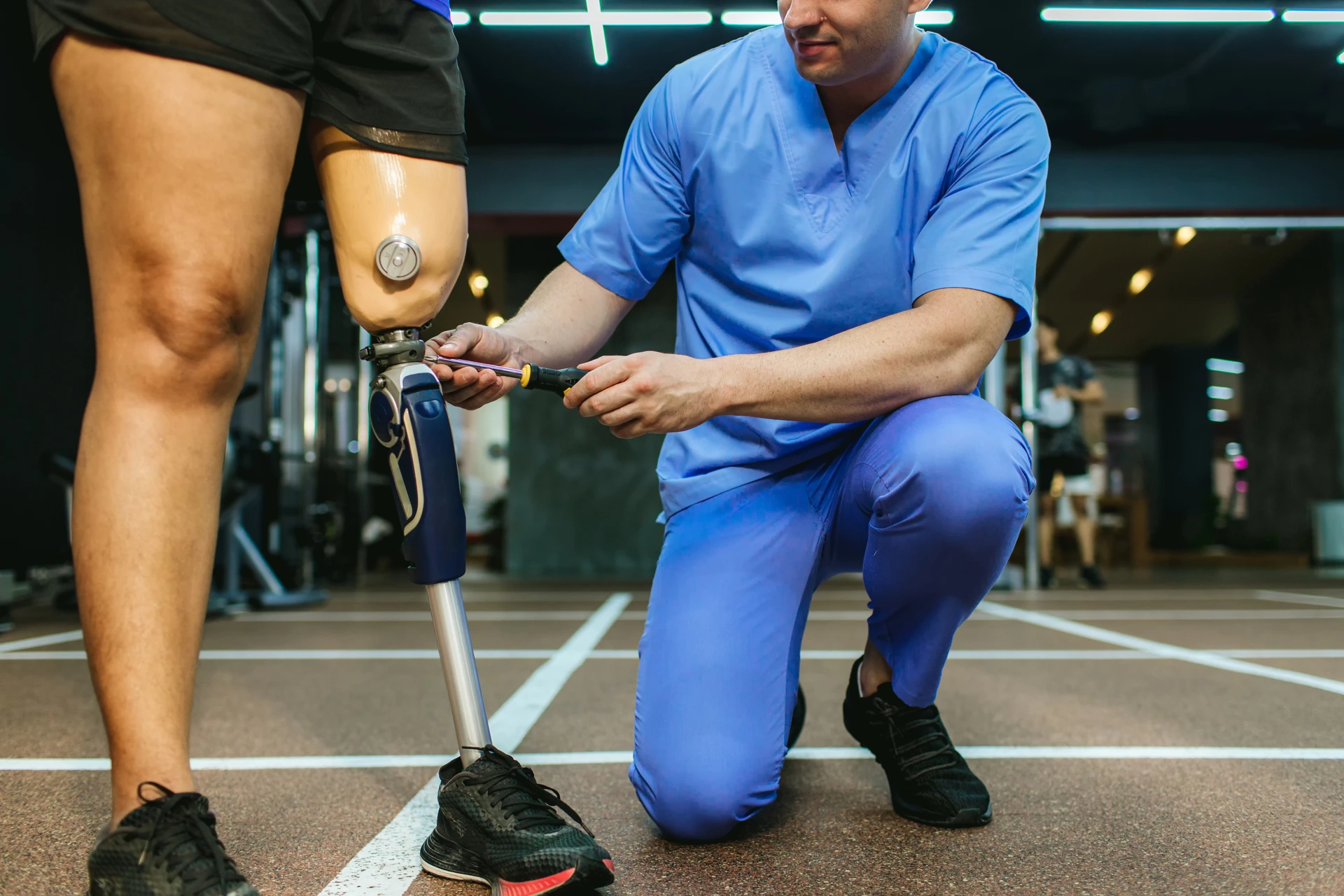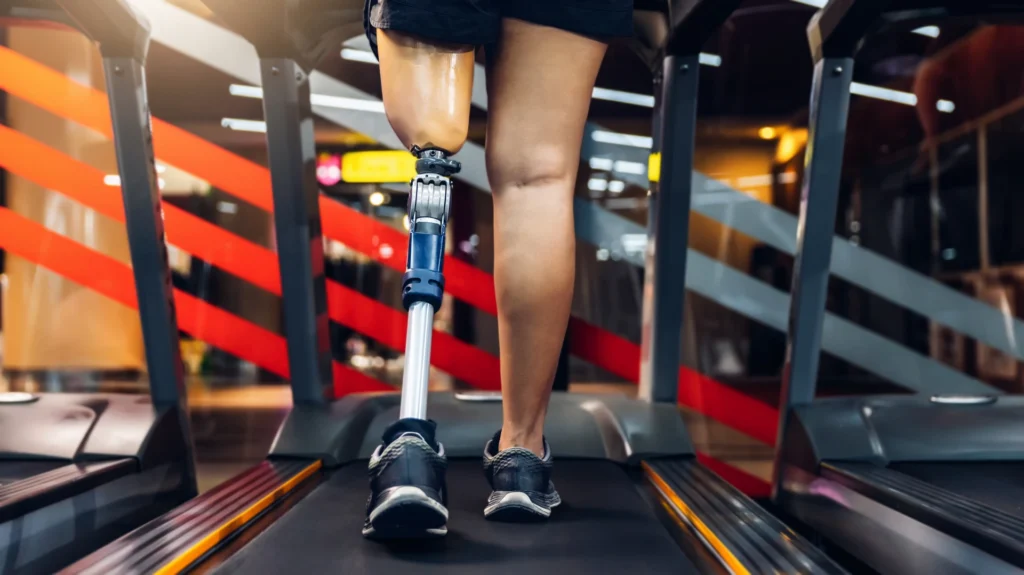
Recovery after an amputation is not just physical; it’s emotional, practical, and deeply personal. Whether you’re adjusting to amputated feet or an amputated arm, your journey involves more than prosthetic fittings.
At West Henday Physical Therapy, our amputee rehabilitation in Edmonton supports your return to movement, strength, and everyday life through personalized mobility and balance training. But before we start, we begin by listening:
You’re not alone, and your rehab plan shouldn’t feel like a one-size-fits-all checklist.
In the early weeks post-amputation, therapy isn’t just about movement; it’s about laying a strong, adaptable foundation. This pre-prosthetic phase supports your residual limb, reduces strain, and prepares your body for later prosthetic use.
During this phase, we focus on:
We take this phase seriously; it sets the tone for a more stable and empowered recovery process.
As healing progresses, we focus on improving how your body moves and adapts to daily demands. The goal here is not just strength, it’s body awareness and control.
In your sessions, you’ll begin:
Developing core stability to protect your spine and support upright posture.
Activating key muscle groups using resistance bands or guided bodyweight movements.
Practicing postural transitions like moving from sitting to standing with alignment and ease.
Exploring balance challenges to prepare for safe, confident movement in daily life.
This stage builds the foundation for the more dynamic training you’ll encounter in the coming weeks.
For clients with lower-limb amputations, walking often feels unfamiliar at first. Our gait retraining goes beyond steps; it’s about retraining the body to move with rhythm and safety.
This includes:
Heel-to-toe walking and stride symmetry
Navigating curbs, stairs, and uneven terrain
Reinforcing weight shifting and balance with or without assistive devices
Integrating your prosthesis, gradually matching your comfort and confidence
We observe closely and adjust as you progress, so every stride feels a little more natural.
If your journey involves an amputated arm or upper-limb loss, therapy shifts to address function through the shoulder, trunk, and intact arm. Our goal is to help you feel capable and supported in tasks that once felt automatic.
We work on:
We adapt movements so they’re not only possible but comfortable and efficient too.
We work with clients facing:
Lower-limb amputation, including above- or below-knee
Upper-limb loss, such as an amputated arm or hand
Multiple limb loss or complex injuries
Compensation injuries from prolonged use of a walker or cane
Long-term fatigue or pain from imbalanced movement
Post-operative setbacks like delayed healing or joint stiffness
Whether you’re just beginning recovery or seeking support years later, it’s never too late to benefit from rehabilitation.
Recovery after an amputation can feel overwhelming at first, but breaking it into clear, manageable phases can help you feel more grounded. While everyone progresses at their own pace, here’s a general timeline of what early amputee rehabilitation at West Henday Physical Therapy might look like:
In the initial phase, our goal is to ease discomfort, protect healing tissue, and gently reintroduce movement.
We help manage edema through limb positioning, compression wraps, and gentle techniques.
You’ll learn how to sit and move without straining your back or overcompensating with your intact limbs.
Light movements help preserve joint flexibility, prevent stiffness, and prepare your body for more active therapy.
We’ll guide you on scar care, skin hygiene, and desensitization strategies to help your residual limb adapt safely.
Seated core work and early stability training start building your foundation for safe standing and transfers.
By now, your body has begun to respond to early strengthening and alignment work. We start progressing those foundations with:
We also continue scar care and desensitization introduced earlier, now incorporating it into movement routines for better adaptation.
Each movement is adjusted to match your comfort and capacity; your progress sets the pace.
Now we shift our focus to restoring everyday movement and preparing for more independence.
For lower-limb amputees, we begin walking retraining either with or without a prosthetic device, focusing on stride, rhythm, and fluid transitions.
We simulate stairs, curbs, uneven surfaces, and daily obstacles to rebuild your adaptability and reduce fear of falling.
We rehearse tasks like dressing, cooking, or moving through tight spaces to make daily life feel smoother and more doable.
You’ll gain tools to build routines that work for you at home, at work, and in your community.
Physical recovery after an amputation is just one part of the journey; adjusting emotionally and rebuilding your sense of independence is equally important. At West Henday Physical Therapy, we create space for that, too.
Amputee rehabilitation in Edmonton isn’t just about exercises and mobility. Our support includes:
We encourage open conversations during your sessions, and we’ll collaborate with other care providers if you’re navigating post-surgical fatigue, isolation, or emotional strain.
At West Henday Physical Therapy, our focus is to support progress after amputation in ways that feel practical, achievable, and empowering. Our amputee rehabilitation in Edmonton is designed for comfort, progress, and your real-life goals.
Schedule your consultation today
Let’s talk about what recovery looks like for you
Yes, even long after amputation, therapy can help address compensation patterns, joint stress, or balance issues that develop over time.
Cold or humid weather can impact residual limb sensitivity or prosthetic fit. We help you adapt your routine during seasonal changes.
Phantom sensations are common. We offer strategies like mirror therapy and desensitization techniques to help you manage them during sessions.
Absolutely. We encourage setting goals based on your lifestyle, whether it’s dancing, gardening, or playing an instrument, so your rehab feels truly personal.
Yes, many feel this way. Part of our approach includes gentle reintegration techniques that help you rebuild trust and connection with your body.

© 2025 West Henday Physical Therapy – Developed by Linkbuffer Studios & Research Labs All rights reserved.